- Home
- Catherine Jinks
The Reformed Vampire Support Group
The Reformed Vampire Support Group Read online
The
Reformed
Vampire
Support
Group
Catherine Jinks
First published in 2009
Copyright © Catherine Jinks 2009
All rights reserved. No part of this book may be reproduced or transmitted in any form or by any means, electronic or mechanical, including photocopying, recording or by any information storage and retrieval system, without prior permission in writing from the publisher. The Australian Copyright Act 1968 (the Act) allows a maximum of one chapter or ten per cent of this book, whichever is the greater, to be photocopied by any educational institution for its educational purposes provided that the educational institution (or body that administers it) has given a remuneration notice to Copyright Agency Limited (CAL) under the Act.
Allen & Unwin
83 Alexander Street
Crows Nest NSW 2065
Australia
Phone (61 2) 8425 0100
Fax (61 2) 9906 2218
Email [email protected]
Web www.allenandunwin.com
National Library of Australia Cataloguing-in-Publication entry:
Jinks, Catherine, 1963- .
The reformed vampire support group.
ISBN 9781741756722 (pbk.).
For secondary school age.
A823.3
Cover and text design by Bruno Herfst
Cover illustration by Heath McKenzie
Printed and bound in Australia by Griffin Press
Set in 12/14 pt Chaparral Pro
10 9 8 7 6 5 4 3 2 1
To Claire Haywood –
your training really put me on the right track
1
Nina was stuck. She didn’t know what to write next.
So far, her teenaged captive had been dragged into a refrigerated meat locker by two thugs armed with a gun and a boning knife. But Zadia Bloodstone was already waiting for them. Hanging upside-down from a meat hook, wrapped in a long black cape and covered by a thin layer of frost, Zadia had cleverly disguised herself as a harmless side of beef. Only when she’d spread her arms wide had the crackle of breaking ice announced her presence.
Bang-bang! Two bullets had promptly smashed into her ribcage. But Zadia wasn’t troubled by bullets, because her vital organs could regenerate themselves at lightning speed. Somersaulting to the floor, she’d walked straight up to the bigger thug and kicked the gun from his hand. Then she’d whirled around to fight off his friend. Within seconds, the two baddies had been knocked out – leaving a very important question unanswered.
What would the rescued boy do?
Obviously, he would be grateful. He might even be dazzled by Zadia’s flawless face and perfect figure. But if he saw her sink her fangs into anyone’s neck, he would also be frightened. He would realise instantly that she was a vampire, and run for the door.
He would be unaware, at this point, that Zadia was a heroic crime-fighter who preyed only on lowlife scum.
Nina chewed away at a lock of her hair, thinking hard. She was in the middle of chapter eight. The room in which she sat was illumined solely by the glow of her computer screen; barely visible in the dimness were her brass bedstead, her Indian cushions and her lava lamp. A poster of David Bowie hung on the wall, curling at the corners. A small bookshelf contained multiple copies of Youngblood (book two of the Bloodstone Chronicles), by someone called N. E. Harris.
Splashed across the cover of Youngblood was a glamorous, slinky young girl with white skin, black hair and ruby-red lips. She wore high-heeled boots and lots of black leather, as well as an ammunition belt. Her canine teeth were long and pointed, but she was stunningly beautiful nonetheless.
She appeared to be leaping from rooftop to rooftop, her black cape streaming out behind her.
‘Nina!’ somebody shouted, from beyond the closed bedroom door. Nina didn’t respond. She stared unblinkingly at the computer screen, still gnawing at her hair – which was thick and dark, and cut in a heavy, clumsy, old-fashioned style that didn’t suit her bony little face.
It was about time, she decided, that Zadia made friends with the boy she’d rescued.
Zadia hesitated, Nina wrote, torn between her desire to punish the wicked and her need to reassure the tall, pale, handsome teenager with the big brown eyes.
‘Nina!’ a distant voice called again. Ignoring it, Nina deleted the word pale. Her hands on the keyboard were like chickens’ feet, all scaly and dry. Her skin was the colour of a maggot’s, and her legs were so thin that her tights were wrinkled around the knees.
Her boots had flat heels on them.
‘Nina!’ The door burst open to admit a withered old woman in a quilted nylon dressing-gown. ‘For God’s sake, are you deaf? Father Ramon’s outside – you want to keep him waiting?’
Nina sighed. She shut her laptop, moving sluggishly.
‘All right,’ she murmured. ‘I’m on my way.’
‘Aren’t you feeling well?’ the old woman wanted to know. She had the hoarse rasp and yellowed fingertips of a chronic smoker; her hair looked like a frayed clump of steel wool, and her scarlet lipstick was bleeding into the cracks around her mouth. ‘Because if you’re sick,’ she said, ‘you shouldn’t be going.’
‘I’m not sick, Mum. I’m fine.’
‘That’s what you always say, and you never are. Is your head giving you trouble?’
‘No!’
‘What about your stomach?’
Nina didn’t reply. Instead she rose, reaching for her sunglasses – which shared the cluttered surface of her desk with a Pet Rock, a pile of vintage vampire comics, and a netball trophy awarded to the ‘Junior Regional Inter-School Champions’ of 1971. Pinned on a noticeboard hanging above the desk lamp were various faded photographs of laughing teenage girls.
If any of these girls was Nina, it wasn’t immediately apparent. They were so sleek and glossy and bright-eyed that they could have belonged to an entirely different species.
‘Are you nauseous?’ her mother nagged. ‘You are, aren’t you?’
‘There’s nothing wrong,’ said Nina, on her way out of the room. It was a lie, of course. There was always something wrong.
And her mother knew it.
‘If you get sick, I want you to come straight home,’ the old woman advised, as they descended a narrow wooden staircase together. ‘Dave won’t mind bringing you back early, if you can’t stay to the end. And don’t leave it till the last minute, the way you did before. Dave won’t want you throwing up all over his sheepskin seat covers again …’
Nina winced. It was true. She had ruined Dave’s precious seat covers. Was it any wonder that he didn’t exactly beat a path to her door? Was it any wonder that she spent so much of her time in imaginary meat lockers with the stylish and vigorous Zadia Bloodstone? At least there were no uncontrollable bouts of vomiting in Zadia’s world.
Nina pulled open the heavy front door of her mother’s terrace house. Outside, the darkness was relieved only by the soft glow of a nearby street lamp; stars were scattered like sequins across a coal-black sky. Yet Nina had already donned her sunglasses, which were big, heavy, wraparound things that made her pinched face look smaller than ever …
You know what? This isn’t going to work. I can’t write about myself the way I write about Zadia. It’s too weird. It’s confusing. Next thing I’ll get mixed up, and start making me do things that I can’t actually do. Like turn into a bat, for instance. Zadia can do that, but I can’t. No one can.
The plain fact is, I can’t do anything much. That’s part of the problem. Vampires are meant to be so glamorous and powerful, but I’m here to inform you that being a
vampire is nothing like that. Not one bit. On the contrary, it’s like being stuck indoors with the flu watching daytime television, forever and ever.
If being a vampire were easy, there wouldn’t have to be a Reformed Vampire Support Group.
As a matter of fact, I was going to a group meeting that very night. Father Ramon had come to pick me up. It was a Tuesday, because all our meetings are held on Tuesdays, at 9.30 PM, in St Agatha’s church hall. And in case you’re wondering why I couldn’t have driven myself to St Agatha’s … well, that’s just one of my many problems. I still look fifteen, you see. I still am fifteen, when all’s said and done, since I stopped ageing back in 1973, when I was infected. So I’d attract far too much attention behind a steering wheel. (Besides which, Mum doesn’t have a car.)
As for the public transport option, Sanford Plackett has ruled that out. He’s always ruling things out; you’d think he was our lord and master, the way he carries on. He’s forbidden any of us to travel around Sydney on buses or trains, for instance, in case we stumble across something that Father Ramon would probably describe as ‘an occasion of sin’. I suppose Sanford’s worried that we might encounter a bleeding junkie rolling around on a station platform, and won’t be able to stop ourselves from pouncing.
‘You think you’ll never succumb,’ he once said to me, ‘because you can’t come to terms with your true nature. You refuse to concede that you’re really a vampire, with a vampire’s weakness. But you are, Nina. We all are. That’s why we have to be careful.’
And being careful means not catching cabs. According to Sanford, it’s too risky. Staring at the back of a cab driver’s exposed neck would be quite stressful for most of us – especially if someone’s been bleeding onto the seats beforehand. Sanford also insists that no one in our group should go wandering the streets all alone. He says that we wouldn’t stand a chance against the drunks and addicts and muggers on the loose out there. He says that everyone should follow his advice, because he’s been around for so long and has so much experience, and because, although Father Ramon might be our group facilitator, even a priest with counselling experience can’t be its leader. Not if he isn’t a vampire himself.
That’s Sanford’s opinion, anyway. He’s got a lot of opinions, let me tell you. And he’s never shy about airing them, whether asked to or not.
He was already in the car when I reached it, because he can’t drive either. People who grew up before the First World War rarely can. Back then, even doctors like Sanford didn’t own motor vehicles – and he certainly couldn’t risk learning to drive now. None of us could. We’d be exposing ourselves to the kind of official scrutiny that you need to avoid at all costs when you’re toting fake IDs. Most of the vampires I know have changed their identities at least once, and Sanford has done it twice, owing to the fact that he doesn’t look his age (believe it or not). Despite his balding scalp and clipped moustache – despite his preference for three-piece suits and fob watches – you’d never guess that he was a hundred and forty years old. The very fact that he’s not six feet underground is a dead giveaway. And he’s no different from the rest of our group, which is full of people living precarious lives, under assumed names, with forged papers.
It’s a real drag, believe me.
‘Hello, Nina,’ he said, as I slid into the back seat of the waiting Nissan Pulsar.
‘Hello, Sanford.’
‘How are you, Nina?’ Father Ramon inquired, pulling out from the kerb.
‘Oh – you know. Nauseous. As usual.’
I didn’t want to complain too much, because that’s what vampires do. They complain too much. But I needn’t have worried. Gladys did the complaining for me.
‘I bet you’re not as nauseous as I was last night,’ she said, moving over to give me some space. ‘I was trying to sell a timeshare, and I spewed all over the phone. At least a cupful of blood. It no sooner went down than it came back up again. I lost the sale and everything – didn’t I, Bridget?’
‘Oh, yes,’ said Bridget, who was knitting. Bridget’s always knitting. She was eighty-two when she was infected, so she can’t do much else. Even climbing stairs can be a problem for Bridget, because of her hip joints.
There’s only one thing worse than being a vampire, and that’s being an elderly vampire with bad hips.
‘Have you been taking your enzymes, Gladys?’ asked Sanford, from the front seat. He craned around to peer at her. ‘Every morning, before you go to bed?’
‘Of course I have!’
‘What about other treatments? Have you been drinking those herbal concoctions again?’
‘No!’ Gladys exclaimed, sounding defensive, though it was a perfectly reasonable question. Gladys smells like a hippie, because she’s always treating her manifold health problems with miraculous new oils or exercises or meditation techniques. She even looks like a hippie, in her beads and her shawls and her long, flowing skirts. Having been infected back in 1908, she can’t bear to expose her legs; ladies didn’t do that sort of thing in the old days, and Gladys likes to think of herself as a lady – even though she was actually a common streetwalker. She also likes to think of herself as a young lady, despite her old-lady obsession with bowels and feet and joint-pain, because she was only twenty-four when she first got infected. But I’m here to tell you, she’s about as young as a fossilised dinosaur egg.
‘I haven’t even been burning scented candles,’ she whined, ‘and I’m still getting that rash I told you about. The one on my stomach.’
‘It might be a bad response to the supplements,’ Sanford mused. ‘I could adjust your levels a bit, I suppose. Have you had any dizzy spells?’
‘Yes! This morning!’
‘What about headaches?’
‘Not since last week. But the other night one of my toenails fell off in the bath—’
At this point I could restrain myself no longer.
‘Hey! Here’s an idea!’ I growled, my voice dripping with sarcasm. ‘Let’s all talk about our allergies, for a change! That’ll be fun.’
There was a long pause. Father Ramon glanced into the rear-view mirror, shooting me one of those reproachful-yet-sympathetic looks in which he seems to specialise. Sanford sniffed. Gladys scowled.
‘Well, what do you want to talk about, then?’ she demanded. ‘What have you been doing lately that’s so wonderful? Watching re-runs of Buffy the Vampire Slayer?’
‘I’ve been writing my book,’ I said, knowing perfectly well what sort of reaction I’d get. And when Sanford removed his sunglasses briefly, to massage the bridge of his nose, I braced myself for the usual guff about how I was putting everyone at risk (even though I write under a pseudonym, and use a post-office box for all my correspondence).
‘Yeah, yeah, I know what you think of my books,’ I added, before Sanford could butt in. ‘Spare me the sermon – I’ve heard it all before.’
‘They’re not doing us any good, Nina,’ he replied. ‘People are scared enough already; you’re only making things worse.’
‘Zadia’s not scary, Sanford. She gets fan mail. She’s a heroine.’
‘She’s a symbol of your flight from reality.’ This was one of Sanford’s stock remarks. For at least twenty-five years he’d been telling me that I was stuck in the denial phase of the Kubler-Ross Grief Cycle (rather than the anger, bargaining, depression or acceptance phases), because I had refused to embrace my true identity as a vampire. ‘You feel compelled to invest vampires with a battery of superhuman powers,’ he said, making reference to Zadia Bloodstone, ‘just so you can tell yourself that you’re not really a vampire. You’re living in a dream world, Nina.’
‘No – you’re living in a dream world.’ I was trying to be patient. ‘You talk to me like I’m still a kid, even though I’m fifty-one years old. Do you know how boring that can get?’
He did, of course. Everyone did, because I’d mentioned it often enough. It had been a good thirty years since our group’s first meeting, so we knew each oth
er pretty well by this time. We’d also covered every subject known to man over and over and over again. It’s something that tends to happen when you don’t mix very much with other people.
Sometimes I look around St Agatha’s vestry on a Tuesday night, and I think to myself, If I never see any of you ever again, I’ll be a happy vampire.
‘You might have lived for fifty-one years,’ Sanford chided, without even bothering to glance in my direction, ‘but you’re still a kid at heart. You’re stuck in a teenage timewarp. You still think like a teen. You still behave like a teen.’
‘What – you mean like this?’ I said, and flipped him the finger. Gladys giggled. Father Ramon changed gears abruptly, though his voice remained calm.
‘Come on, now,’ he remonstrated. ‘That’s enough. If you want to argue … well, you should at least wait until the meeting.’
Sanford’s mobile phone began to trill. While he fumbled inside his jacket, I turned my face to the window. Street lamps were gliding past, illuminating the kind of neighbourhood that I’ve always enjoyed looking at. House-fronts were shoved up hard against the pavement. Though the gaps between shrunken curtains and broken cedar slats I could see flickering television screens, curling drifts of cigarette smoke, and people rushing from room to room, slamming doors.
But I couldn’t see enough. I never can. I always get a fleeting glimpse of normal life before it’s whisked away – before I’m back in a crowded car with a bunch of vampires.
‘Oh. Hello, Dave.’ Sanford had found his phone, at long last. ‘Yes. Yes. Dear me. That is troubling. Yes, I’ll tell him.’ Addressing the priest, Sanford delivered Dave’s news with solemn emphasis. ‘Dave says that Casimir won’t answer his intercom,’ Sanford announced. ‘They’ve been trying for about ten minutes. Dave wants to know if you still have a spare key.’
‘Yes, I do,’ said Father Ramon. He sounded worried. ‘Tell him I’ll swing round.’
‘Did you hear that?’ Sanford addressed his mobile again. ‘He said we’ll swing round. Yes. Well, I hope so. All right. Yes, see you soon.’

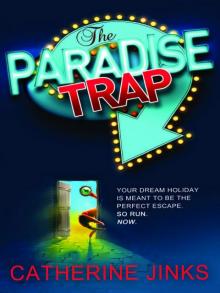 The Paradise Trap
The Paradise Trap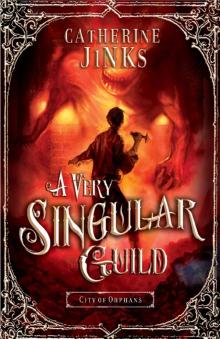 A Very Singular Guild
A Very Singular Guild Eloise
Eloise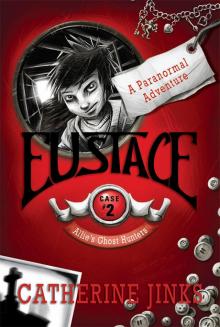 Eustace
Eustace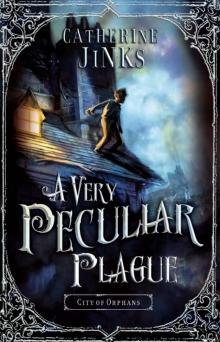 A Very Peculiar Plague
A Very Peculiar Plague Pagan's Crusade
Pagan's Crusade The Gentleman's Garden
The Gentleman's Garden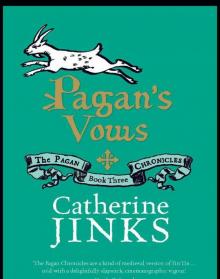 Pagan's Vows
Pagan's Vows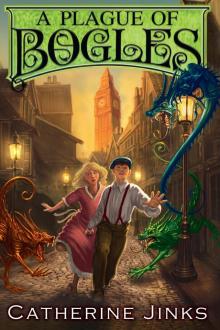 A Plague of Bogles
A Plague of Bogles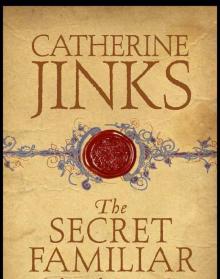 The Secret Familiar
The Secret Familiar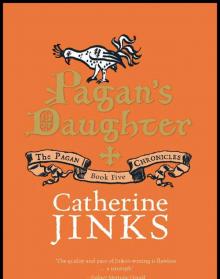 Pagan's Daughter
Pagan's Daughter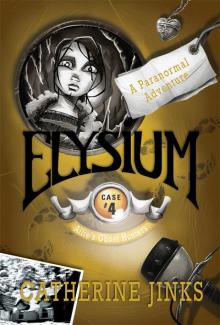 Elysium
Elysium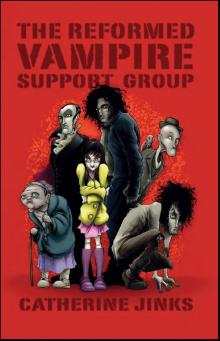 The Reformed Vampire Support Group
The Reformed Vampire Support Group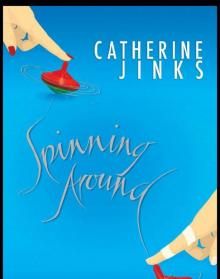 Spinning Around
Spinning Around Pagan's Scribe
Pagan's Scribe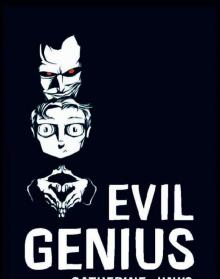 Evil Genius
Evil Genius Pagan in Exile
Pagan in Exile Shepherd
Shepherd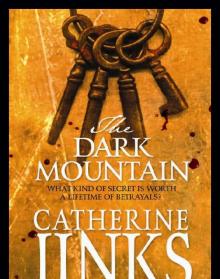 The Dark Mountain
The Dark Mountain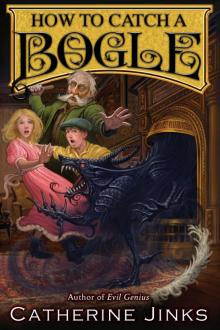 How to Catch a Bogle
How to Catch a Bogle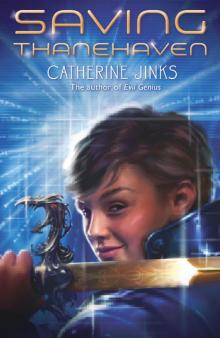 Saving Thanehaven
Saving Thanehaven The Genius Wars
The Genius Wars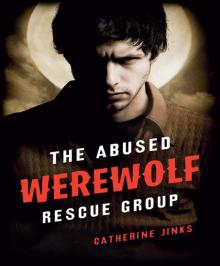 The Abused Werewolf Rescue Group
The Abused Werewolf Rescue Group Theophilus Grey and the Traitor's Mask
Theophilus Grey and the Traitor's Mask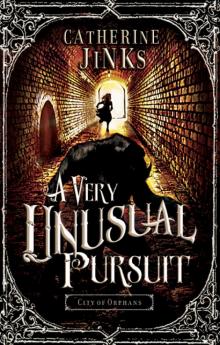 A Very Unusual Pursuit
A Very Unusual Pursuit Genius Squad
Genius Squad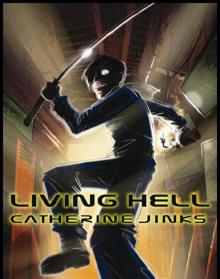 Living Hell
Living Hell The Road
The Road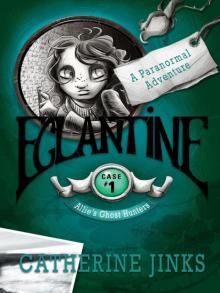 Eglantine
Eglantine